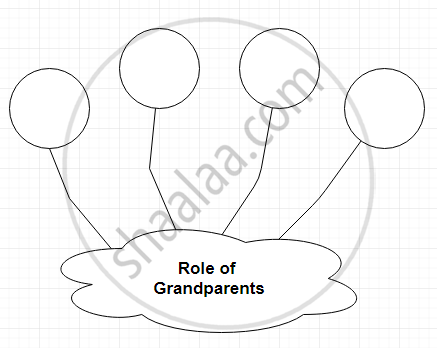Advertisements
Advertisements
Question
A bridge connects people on either side of a river or valleys in cities or villages. Discuss with your partner the importance of a bridge to both the cities and the villages and complete the table.
| Cities | Villages |
Solution
| Cities | Villages | |
| i. | Connects two harbours for easy commuting | To cross a river on foot |
| ii. | Connects two places for transportation of goods | Carry goods to sell in the nearby market |
| iii. | To by-pass traffic congestion on roads | To enjoy the scenic beauty |
| iv. | Architectural and cultural significance; tourist attraction | Accessibility to basic amenities like medical help in case of emergencies and schools of higher education. |
| v. | Social connectors; enabling commerce and interaction between people of different regions | Ease and safety of travel is closely related to the upliftment of remote villages |
APPEARS IN
RELATED QUESTIONS
Read the following passage carefully and do the given activities:
A.1) True or False:
Write the statements and state whether they are true or false:
(i) Those who choose to live well must help others.
(ii) If neighbors grow inferior corn, cross-pollination will steadily improve the quality.
(iii) The farmer grew award-winning corn.
(iv) The reporter discovered that the farmer didn’t share his seed corn with his neighbors.
There once was a farmer who grew award-winning corn. Each year he entered his corn in the state fair where it won a blue ribbon. One year a newspaper reporter interviewed him and learned something interesting about how he grew it. The reporter discovered that the farmer shared his sweet corn with his neighbors. “How can you afford to share your best seed corn with your neighbors when they are entering corn in competition with yours each year?” the reporter asked.
“Why sir”, said the farmer, “didn’t you know? The wind picks up pollen from the ripening corn and swirls it from field to field. If my neighbors grow inferior corn, cross-pollination will steadily degrade the quality of my corn. If I am to grow good corn, I must help my neighbors grow good corn.” He is very much aware of the connectedness of life. His corn cannot improve unless his neighbor's corn also improves. So it is with our lives. Those who choose to live in peace must help their neighbors to live in peace. Those who choose to live well must help others to live well, for the value of a life is measured by the lives it touches.
The lesson for each of us is this: if we are to grow good corn, we must help our neighbors grow good corn.
A.2) Consequences:
Write the consequences:
(i) The farmer shares the corn.
(ii) The farmer doesn’t share the corn.
A.3) Antonyms:
Find out the words opposite in meaning from the passage:
(i) superior x _______
(ii) lost x _______
(iii) improve x _______
(iv) inconstantly x _______
A.4) Language study:
(i) We must help our neighbors. (Replace the modal auxiliary showing advice).
(ii) The wind picks up pollen from ripening corn and swirls it field to field. (Use “not only…….. but also” and rewrite)
A.5) Personal Response:
What do you learn from the story? Suggest a suitable title.
Read the following extract and do the given activities:
B.1) Fill in the Balloons with suitable ideas from the poem:
 “Oh, the value of the elderly! How could anyone not know?
“Oh, the value of the elderly! How could anyone not know?
They hold so many keys, so many things they can show.
We all will read the other side this I firmly believe
And the elderly are closest oh what clues we could retrieve.
For their characters are closest to how we’ll be on high.
They are the ones most developed, you can see it if you try.
They’ve let go of the frivolous and kept things that are dear
The memories of so sweet, of loved ones that were near.
As a nation, we are missing our greatest true resource,
To get to know our elders and let them guide our course.”
B.2) Find Evidence:
Pick out the line from the extract which supports the given ideas:
(i) The elders have many things to share.
(ii) Everybody knows the value of elderly people.
(iii) The elderly people have vast experience.
(iv) The elderly people are a boon to the nation.
B.3) Write a pair from the extract that rhymes with the given word:
| Fear | ........................... | .......................... |
Attempt the following question in 100 – 150 words.
What do you think about Anne’s talent for writing essays which she wrote convincingly when punished by the teacher?
Number the points.
The story begins with a description of the setting. How does this serve as a fitting prelude to the events described in the story?
“I have done something; oh, God! I've done something real at last.” Why does Andrew say this? What does it mean?
What does the line 'I never writ, nor no man ever loved' imply?
Why is the speaker’s childhood described as ‘a forgotten boredom’?
The power of poetry lies in suggestion and understatement. Discuss this with reference to the poem.
Comment on the physical features of the hawk highlighted in the poem and their significance.
What facet of political life does the behaviour of Ajamil illustrate?
Read the extract 'Being Neighborly' and complete the following statement:
In order to tidy the room, Jo __________________.
Give a brief account of the interaction between Grandpa and Jo.
Name the world-famous personality who reached great heights despite of humble circumstances.

Some poets do not use uniformity in rhyming words, nor a steady rhythm. Such poems with no uniformity in rhyme, rhythm, length of lines or stanzas are called Free Verse. Walt Whitman, Ezra Pound, T.S. Eliot, Rabindranath Tagore are some famous poets who have composed poems in Free Verse.
A quick glance at the poem ‘Vocation' reveals that the style used by Tagore is Free Verse.
Now turn the pages of your textbook and see if you can find other poems in Free Verse.
Read the text and enlist the achievements and honours of Ramanujan, received in England.
Can you name different types of fabrics? Which is the most expensive fabric you know? Talk to your parents or to a textile shop assistant. Collect samples of as many types as you can and paste them into your scrapbook. Name each type.
Match the columns :
| A | B |
| (1) Theseus | (1) Robin Goodfellow |
| (2) Titania | (2) Queen of the Amazons |
| (3) Puck | (3) Duke of Athens |
| (4) Hippolyta | (4) Faeries |
| (5) Cobweb, Moth | (5) Queen of the Faeries |
Discuss the following question after you have seen a presentation of the ‘ad’.
Why does Didi say ‘No party for me!’?
Who do you think benefits most from commercial advertisements?
An activity:
Speak fast, think faster ! Form groups of 4-6. Discuss each of the following topics. Then each person in the group should choose a topic and speak about it for one minute. Try to say as many sentences as you can in that time.
What may happen...
I may study... A bird may fly into the classroom. The Principal may call me... It may rain... A dog may chase a cat... A king may lose his kingdom... My friend may give me a storybook to read... Mother may make idlis today...’ etc.
From the play, find all the words that are related to the following:
knowledge and learning
Add other related words you know to the list.
Write the symbol that is used in the poem to represent the following idea.
Some other time.
Use the following outline to develop a story as a group activity. Then write the story individually.
Family returns home late at night ______ hear converstation between thieves from inside the locked house ______ family gets ready to counter ______ attack ______ father opens the door ______ all enter ______ no one is seen ______ but TV is on detective serial midway.
Describe the following in one or two lines.
The world around the bird’s nest.
What did the husband want to do with the extra milk?
Look at the speaker in each picture. Say whether each one is a good speaker. Give reasons for your answer.
 |
 |
 |
 |
 |
Describe Gulliver’s home in Lilliput.
In what way can we help to reduce or minimize waste generation?
Discuss the issue in groups of 4 or 5 and note down all good suggestions.
Resolve to follow them yourself. Some have been given below for your reference.
- Don’t waste food.
- Take as much as you want but finish everything that’s on your plate.
- Don’t throw away broken or half-used things. Repair them and use them.
- Avoid things which can be used only once.
For example: thermocol (polysterene) cups, plastic glasses, etc. - Reuse!
- Recycle!
Write what the following do, with the help of the poem.
ripples
Write some more expressions like ‘hundreds of’. Expand each expression.
Example, ‘Hundreds of children in the school.’
Why does the poet say that the dewdrops greet the dawn?
List all the pairs of antonyms you find in the passage.
Find a word that has a similar meaning.
happily
Guess the meaning of dreary.
Identify the character or speaker.
What a trouble must I have been to you then!
Why was it a struggle for the children to dry their clothes?
We should learn to ______questions.
- ask
- answer
- discard
Why was Sir Francis angry?
What is the poem about?
How did Grandfather’s dream come true?
What did Amma mean when she said tomatoes, ladies' fingers and corn came from other countries?
What did mother ask Raj to buy?
Geetha madam couldn’t stop the children running out of the train because they ______.
The wild boar settled down scraping the hole into a ______ to have a good sleep.
In this story, what happened to the Earth?
What did Nilavan see through the window?
Read scene I of the play carefully and answer the question below.
Whom does Mother Wolf talk about? How does she describe him?
The old man is _____.
Choose the correct picture for the passage.
There is a table under a tree. A man with a big hat and a hare with long ears are sitting. A young girl is sitting between them. There are many cups on the table. The girl has a cup in her hand, and the man has a pot in his hand. It seems like they are having tea. Yes, they are having tea at the tea party in Wonderland. The girl is Alice, and she is in Wonderland.
Why was the teacher annoyed?
Leafcutter ants drink______.
Savings is done after fulfilling the______.
Join the word with the correct prefix.
| paid | un |
| send | dis |
| able | re |
| continue | pre |
Secondly the greedy merchant is ready to offer______.
Which problem do you think you can solve with art? How?
Match the rhyming words.
| strokes | floor |
| shore | rush |
| brush | chokes |
What happen to a child who shuts his ears?
Name a few things that sink.
Which part of the plant should be watered?
